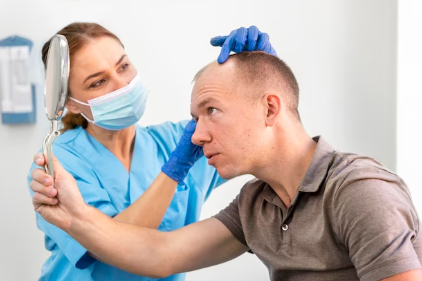Causes of Hair Loss and Hair Thinning
Hair loss and hair thinning can be caused by a variety of factors, including:
Genetics: A family history of hair loss, known as androgenetic alopecia, is a common cause. It can affect both men (male pattern baldness) and women (female pattern baldness).
Hormonal Changes: Hormonal imbalances due to factors such as pregnancy, childbirth, menopause, and thyroid disorders can contribute to hair loss.
Medical Conditions: Certain medical conditions like alopecia areata (an autoimmune disease), lupus, and scalp infections can lead to hair loss.
Medications and Treatments: Chemotherapy, radiation therapy, and some medications (such as those for high blood pressure, depression, and arthritis) can cause hair loss as a side effect.
Poor Nutrition: Inadequate intake of essential nutrients, especially iron and protein, can impact hair health.
Stress: Physical or emotional stress can lead to temporary hair loss, a condition known as telogen effluvium.
Hairstyles and Hair Treatments: Excessive pulling or tension on the hair (traction alopecia) due to tight hairstyles like braids or ponytails, as well as frequent use of harsh chemicals and heat styling, can damage hair follicles.
Aging: As we age, the rate of hair growth can slow down, and hair may become thinner.
Autoimmune Conditions: Conditions like lupus and alopecia areata involve the immune system attacking hair follicles.
Nutritional Deficiencies: Lack of essential vitamins and minerals, such as vitamin D, biotin, and zinc, can contribute to hair thinning.
Weight Loss: Rapid and significant weight loss can trigger hair shedding.
Anemia: Iron deficiency anemia can lead to hair loss.
Chemical Exposure: Exposure to harsh chemicals, pollutants, and toxins can damage hair and lead to hair loss.
DHT (Dihydrotestosterone): An androgen hormone that can contribute to hair loss by shrinking hair follicles.
Chronic Illness: Certain chronic illnesses and conditions can affect the hair growth cycle.
It’s important to note that the specific cause of hair loss can vary from person to person. If you’re experiencing significant hair loss or hair thinning, it’s advisable to consult a healthcare professional or dermatologist to determine the underlying cause and appropriate treatment options.



